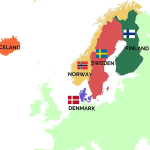Welcome to our comprehensive guide on the legal and regulatory requirements for companies operating in the Nordic countries. From Nordic Countries requirements to legal requirements and regulatory requirements, this article will provide you with valuable insights to navigate the complexities of conducting business in this region.
Companies intending to establish a presence or expand their operations in the Nordic countries need to be well-versed in the local legal landscape. Understanding and complying with the legal and regulatory obligations are essential for business success and avoiding potential legal issues.
In the following sections, we will discuss various important aspects, including company registration and formation, employment and labor laws, taxation and financial obligations, and data privacy and cybersecurity. By diving into these topics, we aim to provide you with a comprehensive understanding of the requirements companies face in the Nordic countries.
Whether you are a small startup or a multinational corporation, this guide will help you navigate the legal requirements and ensure compliance with the regulations governing companies in Nordic Countries. By doing so, you can protect your business, maintain good standing, and establish a strong foundation for growth.
Company Registration and Formation
Before starting operations in the Nordic countries, companies must navigate the process of company registration and formation. Establishing a legally recognized presence in the Nordic countries involves understanding the necessary steps, choosing the right business entity, completing registration paperwork, and complying with local regulations.
When registering a company, one of the first decisions to make is choosing the most suitable business entity. This could be a private limited company, a public limited company, a partnership, or a sole trader. Each entity type has its own benefits, such as limited liability or tax advantages, so it’s crucial to make an informed decision.
Once the business entity is chosen, the next step is to complete the registration paperwork. This usually involves submitting documents like the articles of association, shareholder details, and the company’s registered address. The exact requirements may vary between the Nordic countries, so it’s essential to research and adhere to the specific regulations of the chosen country.
Complying with local regulations is of utmost importance when registering and forming a company in the Nordic countries. It’s essential to familiarize yourself with the legal requirements related to company registration, taxation, employment, and reporting obligations. This will ensure that the company operates in compliance with the law and avoids any potential legal issues.
By successfully navigating the process of company registration and formation and understanding the legal entity requirements, businesses can establish a solid foundation for their operations in the Nordic countries.
Employment and Labor Laws
Companies operating in the Nordic countries must comply with robust employment and labor laws to ensure fair and ethical treatment of their employees. These laws cover various key aspects of employment, safeguarding employee rights and promoting a healthy work environment.
Employment Contracts
Employment contracts serve as important legal agreements between employers and employees. They outline key terms and conditions of employment, such as job responsibilities, working hours, and compensation. In the Nordic countries, it is essential for companies to have written employment contracts in place to protect both parties and clarify their rights and obligations.
Working Hours
Labor laws in the Nordic countries set limits on working hours to protect employee well-being and work-life balance. Companies must ensure that employees’ working hours comply with these regulations, including maximum daily and weekly working hours, rest breaks, and provisions for overtime work. By adhering to these laws, companies prioritize the health and safety of their workforce.
Minimum Wage
The Nordic countries have regulations in place to ensure employees receive fair remuneration for their work. Companies must adhere to minimum wage laws that prescribe the minimum hourly or monthly wage rates for different industries and occupations. By respecting these regulations, companies contribute to a fair and equitable economic environment for their employees.
Parental Leave
The Nordic countries are renowned for their progressive policies on parental leave. These countries provide generous parental leave allowances for both mothers and fathers, allowing them to take time off work to care for their newborns or adoptive children. Companies must ensure that employees are aware of their rights and entitlements to parental leave, fostering a family-friendly workplace culture.
Anti-Discrimination Policies
It is crucial for companies in the Nordic countries to actively promote diversity and inclusion in the workplace. Labor laws prohibit discrimination based on factors such as gender, age, ethnicity, disability, and sexual orientation. Companies must establish anti-discrimination policies, provide equal opportunities for all employees, and address any instances of discrimination promptly and effectively.
By understanding and complying with the employment and labor laws in the Nordic countries, companies can create a harmonious work environment that values and respects the rights and well-being of their employees.
Taxation and Financial Obligations
The Nordic countries are known for their robust tax systems that companies operating within the region must navigate. Understanding the various types of taxes and financial obligations is essential for businesses to ensure compliance and avoid penalties.
Corporate Tax
One crucial aspect of the Nordic countries’ tax system is corporate tax. Companies are required to pay corporate tax on their profits, which helps fund public services and infrastructure development in these nations. It is essential for businesses to understand the corporate tax rates and regulations in each Nordic country where they operate.
Value-Added Tax (VAT)
Another significant tax that companies must consider is value-added tax (VAT). VAT is a consumption tax levied on goods and services at each stage of production and distribution. Businesses are generally responsible for collecting and remitting VAT to the tax authorities. Understanding VAT rates and regulations is crucial for accurate tax reporting and compliance.
Payroll Taxes
Companies operating in the Nordic countries must also fulfill their payroll tax obligations. Payroll taxes are social security contributions that employers deduct from their employees’ wages to fund social welfare programs. These taxes vary between countries and are calculated based on the employee’s salary and benefits. Compliance with payroll tax requirements ensures that businesses support the welfare of their employees and contribute to society.
Financial Reporting Obligations
In addition to taxation, companies in the Nordic countries have financial reporting obligations. They must prepare and submit financial statements, including income statements, balance sheets, and cash flow statements, in accordance with local accounting standards. Meeting the deadlines for financial reporting is essential to maintain transparency and keep regulatory authorities informed about the company’s financial performance.
Complying with taxation and financial obligations not only ensures good standing within the Nordic countries but also contributes to the overall stability and growth of the region’s economy. Businesses should stay updated with any changes in tax laws and regulations to avoid penalties and optimize their financial strategies.
Data Privacy and Cybersecurity
Protecting sensitive data and ensuring cybersecurity are paramount for businesses operating in the Nordic countries. With the ever-increasing risk of cyber threats, companies must adhere to stringent data privacy regulations and comply with the General Data Protection Regulation (GDPR).
The Nordic countries have implemented robust data privacy laws to safeguard personal information and provide individuals with control over their data. Companies must obtain explicit consent before collecting and processing personal data, ensuring transparency and accountability throughout the data lifecycle.
Furthermore, cybersecurity measures play a crucial role in protecting data from unauthorized access and malicious attacks. Organizations must implement strong encryption, firewalls, and secure authentication protocols to maintain data integrity and confidentiality.
Compliance with data privacy and cybersecurity regulations not only ensures legal compliance but also helps businesses build trust with their customers. By prioritizing data privacy and investing in robust cybersecurity measures, companies can foster a secure environment, protect sensitive information, and mitigate potential legal and reputational risks.














